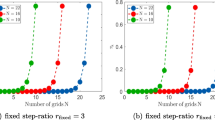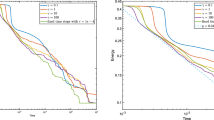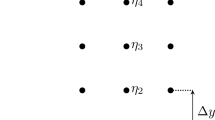Abstract
This article is concerned with the \(L^2\) norm error analysis of high-order BDF methods for the incompressible Navier–Stokes equation subjected to no-slip boundary conditions. To mitigate the complexity of high-order time-step** algorithms caused by decoupling strategies, we combine the prediction–correction technique with a generalized scalar auxiliary variable approach to devise a family of linear, energy stable BDF schemes up to fifth-order accuracy in time. All the proposed schemes can be decoupled into a sequence of Poisson-type equations for the pressure and velocity fields, which significantly reduces the size of the linear systems at each time step. To deal with the essential difficulty raised by the non-A-stability of high-order BDF schemes, we introduce a class of discrete orthogonal convolution kernels to develop a unified framework for the \(L^2\) norm convergence analysis of the proposed high-order BDF schemes. The velocity attains optimal rate of convergence in the \(L^2\) norm under some mild mesh restrictions. Furthermore, building on the recent results concerning the positive definiteness of high-order BDF convolution kernels, we also provide an error estimate of the pressure in a weak \(L^2\) norm. Benchmark examples including the Taylor–Green vortex problem and the regularized lid-driven cavity flow with Reynolds numbers up to 5000 are included to verify the stability and high accuracy of our numerical schemes.



Similar content being viewed by others
Data Availability
Enquiries about data availability should be directed to the authors.
References
An, R., Gao, H., Sun, W.: Optimal error analysis of Euler and Crank–Nicolson projection finite difference schemes for Landau–Lifshitz equation. SIAM J. Numer. Anal. 59, 1639–1662 (2021)
Archilla, B., Novo, J.: Robust error bounds for the Navier–Stokes equations using implicit–explicit second order BDF method with variable steps. IMA J. Numer. Anal. (2022). https://doi.org/10.1093/imanum/drad058
Baker, A., Dougalis, V., Karakashian, O.: On a higher order accurate fully discrete Galerkin approximation to the Navier–Stokes equations. Math. Comput. 39, 339–375 (1982)
Boisneault, A., Dubuis, S., Picasso, M.: An adaptive space–time algorithm for the incompressible Navier–Stokes equations. J. Comput. Phys. 493, 112457 (2023)
Canuto, C., Hussaini, M., Quarteroni, A.: Spectral Methods in Fluid Dynamics. Springer, New York (2012)
DeCaria, V., Guzel, A., Layton, W., Li, Y.: A variable stepsize, variable order family of low complexity. SIAM J. Sci. Comput. 43, A2130–A2160 (2021)
DeCaria, V., Layton, W., Zhao, H.: A time-accurate, adaptive discretization for fluid flow problem. Int. J. Numer. Anal. Model. 17, 254–280 (2020)
DeCaria, V., Schneier, M.: An embedded variable step IMEX scheme for the incompressible Navier–Stokes equations. Comput. Methods Appl. Mech. Eng. 376, 113661 (2021)
Emmrich, E.: Error of the two-step BDF for the incompressible Navier–Stokes problem. SAIM-Math. Model. Num. 38, 757–764 (2004)
Guermond, J., Shen, J.: A new class of truly consistent splitting schemes for incompressible flows. J. Comput. Phys. 192, 22 (2003)
Hairer, E., Wanner, G.: Solving Ordinary Differential Equation II. Springer, Berlin (2010)
Hay, A., Etienne, S., Pelletier, D., Garon, A.: hp-Adaptive time integration based on the BDF for viscous flows. J. Comput. Phys. 291, 151–176 (2015)
Huang, F., Shen, J.: Stability and error analysis of a class of high-order IMEX schemes for Navier–Stokes equations with periodic boundary conditions. SIAM J. Numer. Anal. 59, 2926–2954 (2021)
Huang, F., Shen, J.: A new class of implicit–explicit BDFk SAV schemes for general dissipative systems and their error analysis. Comput. Methods Appl. Mech. Eng. 392, 114718 (2022)
Huang, F., Shen, J.: Stability and error analysis of a second-order consistent splitting scheme for the Navier–Stokes equations. SIAM J. Numer. Anal. 61, 2408–2433 (2023)
Kang, Y., Liao, H.-L.: Energy stability of BDF methods up to fifth-order for the molecular beam epitaxial model without slope selection. J. Sci. Comput. 91, 47 (2022). https://doi.org/10.1007/s10915-022-01830-x
Li, X., Shen, J.: Error analysis of the SAV-MAC scheme for the Navier–Stokes equations. SIAM J. Numer. Anal. 58, 2465–2491 (2020)
Li, X., Shen, J.: Error estimate of a consistent splitting GSAV scheme for the Navier–Stokes equations. Appl. Numer. Math. 188, 62–74 (2023)
Li, X., Shen, J., Liu, Z.: New SAV-pressure correction methods for the Navier–Stokes equations: stability and error analysis. Math. Comput. 91, 141–167 (2022)
Li, Z., Liao, H.-L.: Stability of variable-step BDF2 and BDF3 methods. SIAM J. Numer. Anal. 60, 2253–2272 (2022)
Liao, H.-L., Kang, Y.: \(\text{ L}^2\) norm error estimates of BDF methods up to fifth-order for the phase field crystal model. IMA J. Numer. Anal. (2023). https://doi.org/10.1093/imanum/drad047
Liao, H.-L., Tang, T., Zhou, T.: A new discrete energy technique for multi-step backward difference formulas. CSIAM Trans. Appl. Math. 3, 318–334 (2022)
Liao, H.-L., Tang, T., Zhou, T.: Discrete energy analysis technique of the third-order variable-step BDF time-step** for diffusion equations. J. Comput. Math. 41, 325–344 (2023)
Liao, H.-L., Zhang, Z.: Analysis of adaptive BDF2 scheme for diffusion equations. Math. Comput. 90, 1207–1226 (2020)
Lin, L., Yang, Z., Dong, S.: Numerical approximation of incompressible Navier–Stokes equations based on an auxiliary energy variable. J. Comput. Phys. 388, 1–22 (2019)
Mortensen, M.: Shenfun: high performance spectral Galerkin computing platform. J. Open Source Softw. 3, 1071 (2018). https://doi.org/10.21105/joss.01071
Shen, J.: Hopf bifurcation of the unsteady regularized driven cavity flow. J. Comput. Phys. 95, 228–245 (1991)
Shen, J.: Efficient spectral-Galerkin method I. Direct solvers for second- and fourth-order equations by using Legendre polynomials. SIAM J. Sci. Comput. 15, 1489–1505 (1994)
Shen, J., Tang, T., Wang, L.: Spectral Methods: Algorithms, Analysis and Applications. Springer, Berlin (2011)
Tabata, M., Uchiumi, S.: An exactly computable Lagrange–Galerkin scheme for the Navier–Stokes equations and its error estimates. Math. Comput. 87, 39–67 (2018)
Wu, K., Huang, F., Shen, J.: A new class of higher-order decoupled schemes for the incompressible Navier–Stokes equations and applications to rotating dynamics. J. Comput. Phys. 458, 111097 (2022)
Yan, Y., Hou, Y., Zhang, M.: Analysis of divergence-free \(\text{ H}^1\) conforming FEM with IMEX-SAV scheme for the Navier–Stokes equations at high Reynolds number. Math. Comput. 340, 557–582 (2023)
Acknowledgements
The authors are very grateful to editor, anonymous referees for their invaluable comments and suggestions which have led to improvement of the paper.
Funding
Bingquan Ji is supported by Grants 2022TQ0046 and 2022M720019 from Postdoctoral Science Foundation of China. Hong-lin Liao is supported by a Grant 12071216 from National Natural Science Foundation of China.
Author information
Authors and Affiliations
Corresponding author
Ethics declarations
Conflict of interest
The authors have not disclosed any competing interests.
Additional information
Publisher's Note
Springer Nature remains neutral with regard to jurisdictional claims in published maps and institutional affiliations.
Rights and permissions
Springer Nature or its licensor (e.g. a society or other partner) holds exclusive rights to this article under a publishing agreement with the author(s) or other rightsholder(s); author self-archiving of the accepted manuscript version of this article is solely governed by the terms of such publishing agreement and applicable law.
About this article
Cite this article
Ji, B., Liao, Hl. A Unified \(L^2\) Norm Error Analysis of SAV-BDF Schemes for the Incompressible Navier–Stokes Equations. J Sci Comput 100, 5 (2024). https://doi.org/10.1007/s10915-024-02555-9
Received:
Revised:
Accepted:
Published:
DOI: https://doi.org/10.1007/s10915-024-02555-9
Keywords
- Incompressible Navier–Stokes equation
- High-order BDF methods
- Generalized scalar auxiliary variable
- Discrete orthogonal convolution kernel
- \(L^2\) norm error analysis




